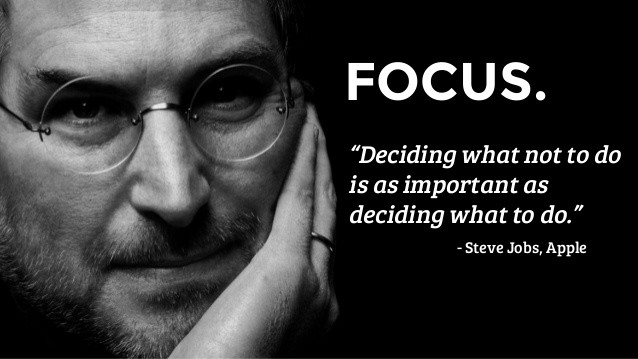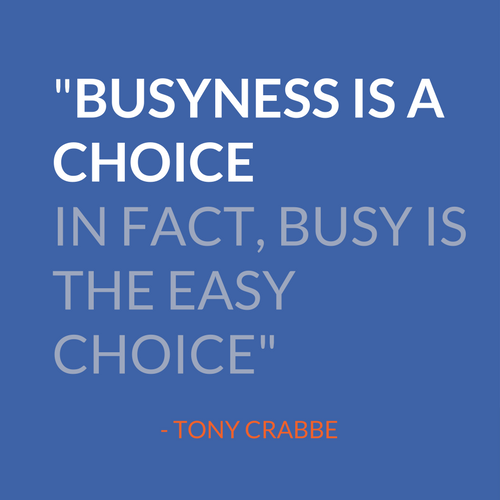Tony Crabbe is hot after the publication of his book BUSY — How to thrive in a world of too much. Time to learn more in a masterclass and meet the man behind statements such as: “Only dummies are too busy.”
Does it make sense to always be busy with more? And, does that really bring better results? No. Most ‘knowledge workers’ are so busy that they have only 15 minutes per day to actually think and reflect on what they are so busy with. As you probably know, at Avanteers we promote living a life without email, as we guide organizations in finetuning their collaborations and communications for a more successful synergy. A lot of the ‘noise’ in most people’s work comes from the email that is a standard part of their routine. The continual checking of emails means that you constantly have to re-focus on what you’re already doing. But how does that impact our workflow? It turns out that when you switch from one task to another, it actually takes 40 percent longer to complete both.
Where do we stand to gain the most in the work we do?
The greatest profit can be gained by reshaping the way you work in the following areas:
1. Focus: What is really important?
2. Choices: How can you make choices without feeling guilty?
3. Borders: How do you manage your expectations?
Precisely because so many of you are too busy to read Mr. Crabbe’s book, we would like to share some of his practical tips that you can easily make part of your way of working. Are you ready for a ‘rethink’? Then, read on…
How to make the switch to being less busy?
How do you make change happen? I personally believe in taking small steps. Choose only one of the following tips that you would like to focus on for now. Follow through with your choice so that it becomes automatic, and a natural part of your sense of time and space. Only then are you ready to choose the next step you’d like to take on.

TIPS — The choice is up to you!
1. Choose your core values
- Be clear about what is really important for you! How? By focusing on your core values — what you are really good at, or what matters the most for your clients, yourself, your family, etc. What is your definition of success? What do you truly want to focus on?
- Don’t do everything! Take for example, Ryanair. They literally say, “We deliver inexpensive flights, without customer service.” So, focus less on more, and prioritise your focus.
- Propose clear rules that you stick to! One of mine is: Say no to people who want to meet for coffee to find out what we can mean for each other.
2. Immerse yourself
- Be present in the moment you are in! If you’re in a meeting, be there 100%… and nowhere else.
- Do one thing at a time! Only start your next task when you’ve finished what you’re already doing. Don’t spend the day juggling tasks. Stick to the task you are busy with, before even thinking about beginning the next. If that’s a challenge for you: take 3 minutes to pause between different tasks to consciously mark the completion of one before starting the next.
- Stop multitasking! It’s an illusion. Doing multiple tasks at the same time reduces your power to think fully about any of them.
- A handy trick for targeting your focus: Choose and connect one word to each task. For example: How can I make a surprising presentation? How can I make an attractive proposal? Let your focus be your inspiration!
3. Stay on the wave!
- Think like a surfer! Choose the wave you want to ride and tube it. Choose your waves and be sloppy elsewhere. Successful people also have chaos in their lives. Dare to excel in a few areas and choose not to do that in other areas.
- Take the time everyday to reflect. Consider 3 simple questions: What have I learned today? What have I contributed? What did I enjoy?
4. Schedule
- Cluster the same sort of tasks together. For example, make all your telephone calls in the morning. Work in blocks and accelerate your efficiency.
- Define your priorities from the start of your day. Jump in at the deep end with the most challenging task at hand
- DON’T start your day with your emails! Since I have made the move to living email-free, it’s shocking for me to think of how many people start their day by checking their email…before they’ve even had breakfast! Doing that means that you start by focusing on tasks that are important for others, and not those that are the most important for you. The result is that you let yourself down, and have missed out on what really matters for you. You’re working in a reactionary mode versus a proactive mode. Learn more about what that difference can mean for you at www.wequitmail.nl
- Break down your major tasks for the day and start with the most challenging task. Try out the 5-minute rule. For example: I’ll clean the house for 5 minutes… just to get started, and before you know it, you’ve spent 30 minutes cleaning and your chore is out of the way! 😉
- ‘Zoom out’ by making an overview of the work at hand, such as a list of all of your projects with deadlines.
5. Avoid distraction
- Avoid the distraction of trying to do everything at once. Eliminate possible distractions…give yourself some space. Turn your telephone off.
- Take control of what distracts you. It’s like taking control of what you’re tempted to eat: if you don’t have it in the cupboard, it’s not a temptation. Take a tip from me and turn all the notifications on your telephone off.
- Work for 50 minutes on one task, and then take 10 minutes to do something else, and before moving on to the next task on your list.
6. Monitor
- Track your progress on the things that are really important to you. It’s important for you to see and know what you’ve accomplished every day.
- Reward yourself. Challenge yourself by starting with the most difficult task, and then treat yourself to a favorite indulgence… perhaps a delicious latte macchiato or a stroll in the park?
- There are also apps that make tracking your progress more tangible for you. An app like Stickk helps you commit to a goal, by asking you to put money on the line towards the accomplishment of your goal.

7. Making Choices
- Choose to be less busy. Which task deserves your attention? Is that difficult for you? Set the timer, and when it goes off…ask yourself: Is what I’m doing now the most deserving of my attention? No? Then turn your attention to the most important matter at hand.
- Ask yourself the question: What will I miss out on if I say ‘no’ to doing something? Say no to the things that are not really important. What are the consequences if you say no? We often imagine them to be worse than they really are. How much does it really matter if I don’t react right now… or today? In reality, it may not really be a concern. It’s often be easier to just say ‘yes’, but… consider the option of just saying ‘no’. Tip: Check out the book The Power of a Positive No
As Steve Jobs said: “It’s just as important to decide what you won’t do as what you will do.”
- Make smarter choices. Do the most important things in the morning because later in the day, you generally make less smart choices.
- Make brave choices. Ask yourself: Is this something that will benefit me? Or, is this something I’d rather avoid?
Would you like to choose to be less busy?
Changing habits can be difficult. You can choose from the list of options above for how you’d like to get started, or add your own options. Do you really want to make a change? Tell us what you’d like to change, how you can make that change easy for you, and how you’ll track your progress.
Write it down and share it:
- What are you going to do?
- When are you going to do it?
- How are you going to do it?
Share your aspirations for change with someone who knows you and will follow you on your path… as long as it takes to make your chosen change a new habit.
Where will you begin? Do you have any tips you’d like to share? We’d love to hear what you have in mind, and what you think!

